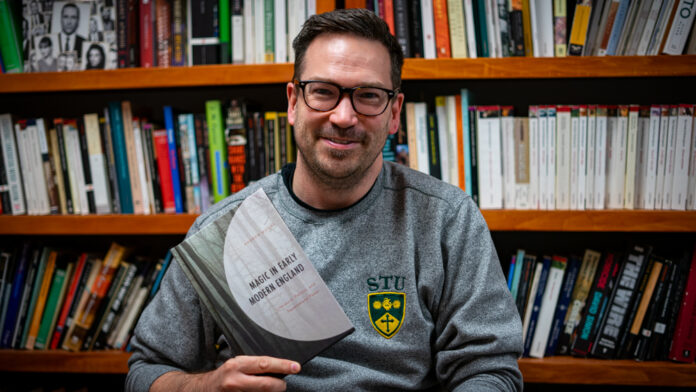St. Thomas University Great Books professor Andrew Moore introduced his new book Magic in Early Modern England on Sept. 22.
Members of faculty gathered in Brian Mulroney Hall to celebrate seven years of Moore’s writing and research. The book is about the importance people gave to the concept of magic at the beginning of modern societies. It “traces a broad cultural fascination with supernatural power,” a topic of interest for Moore.
“I thought that magic would make a more interesting subject and might be a topic that would bring together all the different things I was interested in,” he said.
At first, he thought his book was going to be based on science. However, as he researched he changed his mind.
“I was going to write about literature on the emergence of the scientific method. But as I started to research early science, I kept running into magic.”
He believes the concept of magic would bring a wider audience. When magic was a part of societies all around the world, the scientific method was just beginning to emerge. Thinkers of the period used magic to explain the unexplained, such as sudden deaths or the belief that witches could travel great distances instantaneously.
Moore recommends the seventh and final chapter of the book to his audience. The chapter covers the works of a woman named Margaret Cavendish, an aristocrat who had a multifaceted vision about society. She was an early scientific writer who theorized about the existence of concepts such as the multiverse and other futuristic ideas.
“She [wrote] an early sci-fi novel … called The Blazing World. That book is maybe not fun to read, it’s kind of boring in some ways, but it’s fascinating,” he said.
Moore points out the relation his topic of study has with Harry Potter. The concept of the first Harry Potter movie is based on a legend from the Middle Ages, the supernatural concept of the philosopher’s stone.
“Something like the philosopher’s stone seems to point to that appetite or fear we have about natural processes, right? We don’t want to die, we don’t want to get involved,” he said.
Moore explains the role of the philosopher’s stone as having the power to provide eternal youth. People that have interest in supernatural concepts such as the philosopher’s stone may find interest in Moore’s book.
“If we have any Harry Potter fans reading, this one’s for you.”

